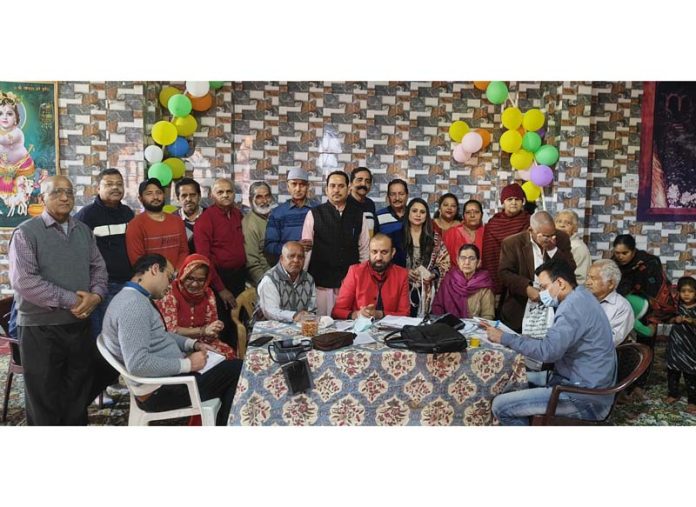Excelsior Correspondent
JAMMU, Mar 10: In view of rapid transition towards urbanisation and proportionate increase in cardiac ailments, Head Department of Cardiology Dr Sushil Sharma held a day long cardiac awareness-cum-health-check-up camp at Hari Mandir, Rehari Colony, today with aim to inculcate cardiac friendly lifestyle along with ongoing advancements in urban areas.
While interacting with the people, Dr Sushil stated that by 2050, it is projected that almost 70% of the world’s population will be living in cities, up from 55% today. The fastest urban growth is happening in Asia and Africa, which is also where we’re seeing a rapid rise in people suffering from, and dying of, heart disease. The impact of on the world population’s health is growing. Non-communicable diseases are those that are not directly transmissible from one person to another. By 2030, scientists predict they will account for 77% of the global burden of disease. Cardiovascular or heart disease is the most common type, responsible for 44 % of all deaths related to this category,” he added.
Dr Sharma elaborated that urban and peri-urban environment are characterized by a tendency to sedentary lifestyle, a diet rich in sodium and calories, excessive alcohol consumption, socio-professional stress, all this in a context of poverty or social insecurity. This results in an increase in biological or physiological risk factors and a vicious circle between non communicable disease which exacerbate poverty and vice versa. The distribution of main risk factors for CVD (i.e., hypertension, type 2 diabetes, hypercholesterolemia, obesity, and smoking) vary widely between global regions, countries and even within a country. Such differences have been imputed to geographical variation, specifically, to urbanization, i.e., whether an individual lives in a rural or urban settings and, altitude, i.e., how far above sea level the subject resides, he said.
He added about the impact of urbanisation on cardiac health told that building cities for cars and urban sprawl encourages car use, traffic congestion, air pollution and noise. “The result is more stress, road trauma and physical inactivity as well as worse health overall and more deaths. It follows that we need better designs for our cities. Research has shown, for instance, that 20% of all deaths could be prevented if cities were designed to meet the recommendations for physical activity, air pollution, noise, heat and green space.”
Others who were part of the Camp include Dr Yashwant Sharma and Dr Dhaneshwer kapoor. Paramedics and volunteers include Kamal Sharma, Raghav Rajput, Ranjeet Singh, Rohit Nayyar, Amish Jamwal, Jatin Bhasin, Paramveer Singh, Maninder Singh, Vinay Kumar, Arun Singh, Gourav Sharma and Vikas Kumar.
Trending Now
E-Paper


